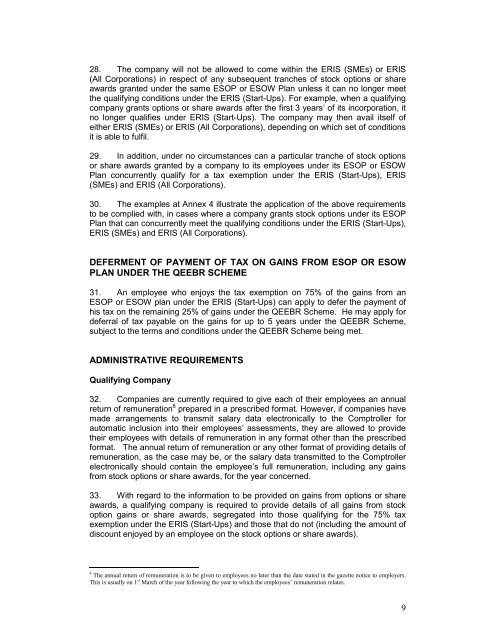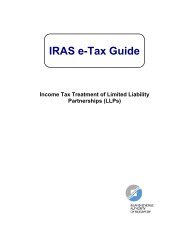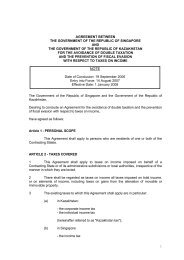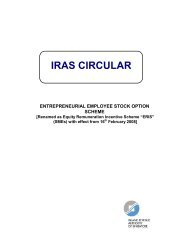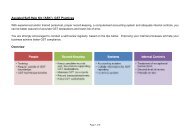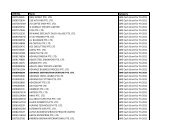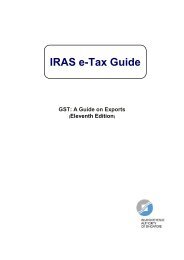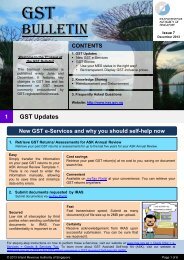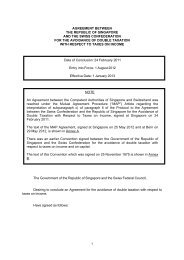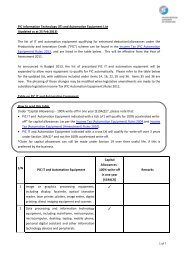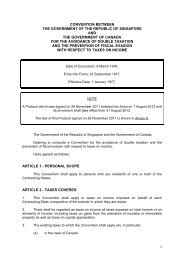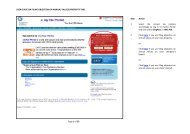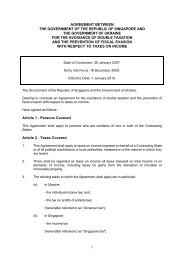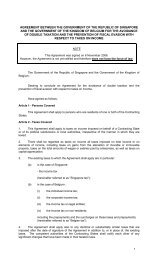Equity Remuneration Incentive Scheme (Start-Ups) - IRAS
Equity Remuneration Incentive Scheme (Start-Ups) - IRAS
Equity Remuneration Incentive Scheme (Start-Ups) - IRAS
You also want an ePaper? Increase the reach of your titles
YUMPU automatically turns print PDFs into web optimized ePapers that Google loves.
28. The company will not be allowed to come within the ERIS (SMEs) or ERIS<br />
(All Corporations) in respect of any subsequent tranches of stock options or share<br />
awards granted under the same ESOP or ESOW Plan unless it can no longer meet<br />
the qualifying conditions under the ERIS (<strong>Start</strong>-<strong>Ups</strong>). For example, when a qualifying<br />
company grants options or share awards after the first 3 years’ of its incorporation, it<br />
no longer qualifies under ERIS (<strong>Start</strong>-<strong>Ups</strong>). The company may then avail itself of<br />
either ERIS (SMEs) or ERIS (All Corporations), depending on which set of conditions<br />
it is able to fulfil.<br />
29. In addition, under no circumstances can a particular tranche of stock options<br />
or share awards granted by a company to its employees under its ESOP or ESOW<br />
Plan concurrently qualify for a tax exemption under the ERIS (<strong>Start</strong>-<strong>Ups</strong>), ERIS<br />
(SMEs) and ERIS (All Corporations).<br />
30. The examples at Annex 4 illustrate the application of the above requirements<br />
to be complied with, in cases where a company grants stock options under its ESOP<br />
Plan that can concurrently meet the qualifying conditions under the ERIS (<strong>Start</strong>-<strong>Ups</strong>),<br />
ERIS (SMEs) and ERIS (All Corporations).<br />
DEFERMENT OF PAYMENT OF TAX ON GAINS FROM ESOP OR ESOW<br />
PLAN UNDER THE QEEBR SCHEME<br />
31. An employee who enjoys the tax exemption on 75% of the gains from an<br />
ESOP or ESOW plan under the ERIS (<strong>Start</strong>-<strong>Ups</strong>) can apply to defer the payment of<br />
his tax on the remaining 25% of gains under the QEEBR <strong>Scheme</strong>. He may apply for<br />
deferral of tax payable on the gains for up to 5 years under the QEEBR <strong>Scheme</strong>,<br />
subject to the terms and conditions under the QEEBR <strong>Scheme</strong> being met.<br />
ADMINISTRATIVE REQUIREMENTS<br />
Qualifying Company<br />
32. Companies are currently required to give each of their employees an annual<br />
return of remuneration 8 prepared in a prescribed format. However, if companies have<br />
made arrangements to transmit salary data electronically to the Comptroller for<br />
automatic inclusion into their employees’ assessments, they are allowed to provide<br />
their employees with details of remuneration in any format other than the prescribed<br />
format. The annual return of remuneration or any other format of providing details of<br />
remuneration, as the case may be, or the salary data transmitted to the Comptroller<br />
electronically should contain the employee’s full remuneration, including any gains<br />
from stock options or share awards, for the year concerned.<br />
33. With regard to the information to be provided on gains from options or share<br />
awards, a qualifying company is required to provide details of all gains from stock<br />
option gains or share awards, segregated into those qualifying for the 75% tax<br />
exemption under the ERIS (<strong>Start</strong>-<strong>Ups</strong>) and those that do not (including the amount of<br />
discount enjoyed by an employee on the stock options or share awards).<br />
8 The annual return of remuneration is to be given to employees no later than the date stated in the gazette notice to employers.<br />
This is usually on 1 st March of the year following the year to which the employees’ remuneration relates.<br />
9


